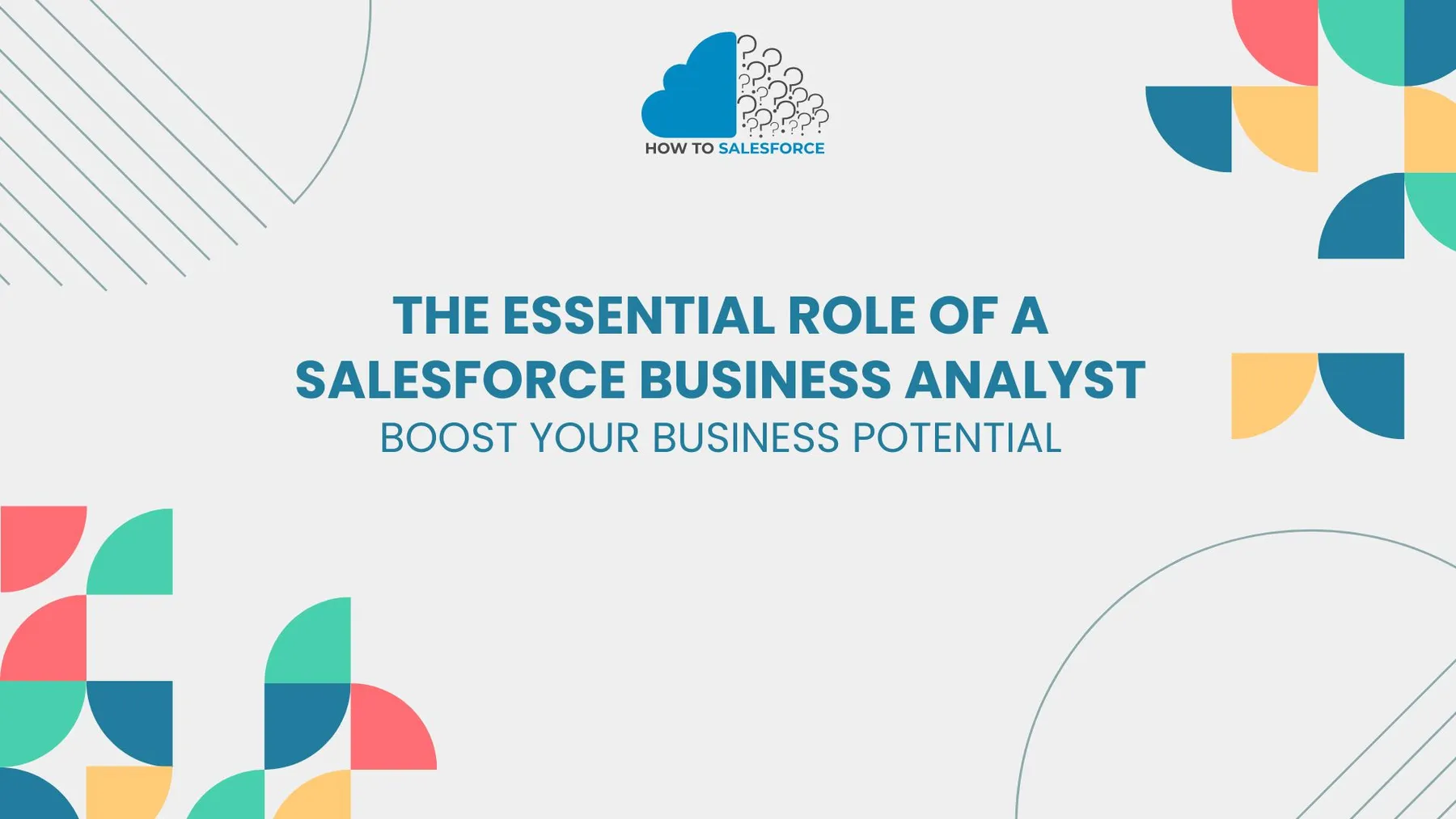Introduction
Salesforce business analysts are essential to closing the gap between Salesforce deployment and business needs. The need for qualified Salesforce Business Analysts has grown as Salesforce is increasingly being used as a cornerstone by numerous enterprises worldwide. This blog will discuss Salesforce Business Analysts’ duties, qualifications, and career prospects.
Please read my other blog: Applications for Salesforce
What is a Salesforce Business Analyst
First, it’s critical to comprehend what a Salesforce Business Analyst does. A Salesforce business analyst is a conduit between stakeholders and the Salesforce development team. They convert business requirements into technical fixes that the Salesforce platform can use.
Key Responsibilities
Salesforce business analysts gather business needs, examine procedures, and determine how to enhance Salesforce workflows. They also work directly with developers and end users to guarantee the successful implementation of Salesforce solutions.
- Collecting and analyzing business requirements
- Mapping out current processes and identifying gaps
- Facilitating communication between stakeholders and technical teams
Why is a Salesforce Business Analyst Important
Salesforce Business Analysts also make ensuring Salesforce is set up to satisfy particular business requirements. By doing this, they assist businesses in getting the most out of their Salesforce investment, guarantee that the platform supports corporate goals, and increase productivity.
Core Skills of a Salesforce Business Analyst
Let’s now examine the fundamental abilities required of a Salesforce Business Analyst. To succeed, Salesforce Business Analysts need a blend of soft skills and technical knowledge. When they possess a balance of these skills, they may successfully navigate challenging corporate situations and provide effective solutions.
Strong Analytical Skills
A Salesforce Business Analyst must possess excellent analytical abilities to evaluate business processes fully. They must comprehend how a company runs and pinpoint development opportunities.
- Business Process Mapping: Salesforce Business Analysts should be able to visualize workflows and recommend areas for improvement.
- Problem-Solving: Salesforce Business Analysts can develop valuable and efficient solutions because of their strong analytical abilities.
Effective Communication
Salesforce Business Analysts also need to communicate well. They must work well with developers and explain technical solutions to non-technical stakeholders.
- Stakeholder Engagement: With clear communication, all stakeholders will comprehend the project’s objectives and anticipated results.
- Documentation: The secret to making Salesforce projects successful is to define the business needs clearly.
Salesforce Business Analyst vs. Salesforce Administrator
Let’s now explain the distinction between a Salesforce Administrator and a Salesforce Business Analyst. Although both positions are essential to the Salesforce ecosystem, they serve different purposes.
Role of a Salesforce Administrator
Salesforce administrators are primarily responsible for the platform’s technical features, including system configuration, security, and user administration. They ensure Salesforce functions properly and satisfies regular operational requirements.
- Controlling permissions and user responsibilities
- Setting up the Salesforce platform for best use
- Guaranteeing the security and integrity of data
Role of a Salesforce Business Analyst
Conversely, Salesforce Business Analysts focus on coordinating Salesforce features with organizational goals. Their primary responsibility is to ascertain if Salesforce settings satisfy business requirements.
- Determining requirements and doing an analysis of company needs
- Converting corporate objectives into Salesforce solutions
- Making sure the platform adds value for the company
The Daily Responsibilities of a Salesforce Business Analyst
Now, let’s examine the daily duties of a Salesforce Business Analyst in more detail. While the tasks assigned to Salesforce Business Analysts may differ based on the organization, they generally follow a similar schedule.
Requirement Gathering
Salesforce Business Analysts prioritize and take time to collect and hone business needs. They interact with different stakeholders to fully understand the business requirements, which they then record for the development team.
- Stakeholder interviews to gather requirements
- Transforming business needs into technical specs
Collaborating with Developers
Salesforce business analysts collaborate closely with the development team to implement business requirements appropriately. They liaise between business teams and developers throughout the development process, clarifying business objectives.
- collaborating with developers on solution designs, resolving problems, or making requirements clear while the project is being developed
Testing and Validation
Salesforce Business Analysts frequently oversee the testing and validation stage following development. They guarantee that the solution is built in a way that satisfies the original business requirements and works as planned.
- User Acceptance Testing (UAT) is being conducted.
- Verifying that the Salesforce solution satisfies operational requirements
Salesforce Business Analyst Certifications
Getting the necessary certifications is a wise investment for Salesforce Business Analysts who want to advance in their field. Certifications authenticate knowledge and increase candidates’ marketability in a competitive job market.
Salesforce Business Analyst Certification
While Salesforce doesn’t offer a certification for Salesforce Business Analysts, several offer helpful information for the position. Certifications like the Salesforce Administrator or Salesforce App Builder are helpful for Salesforce business analysts.
- Salesforce Administrator: Validates a strong understanding of the core Salesforce platform.
- Salesforce App Builder demonstrates the use of Salesforce tools to create custom applications.
Other Relevant Certifications
Salesforce Business Analysts also have the option to obtain certificates in general business analysis. These qualifications improve analytical abilities and provide a more comprehensive grasp of business analysis techniques.
- Certified Business Analysis Professional (CBAP): emphasizes sophisticated methods and resources for business analysis.
- Agile Business Analysis: focuses on the abilities required to produce value more quickly and operate in agile environments.
Challenges Faced by Salesforce Business Analysts
Like any job, Salesforce Business Analyst work has its share of difficulties. Let’s examine a few typical roadblocks and how Salesforce Business Analysts can successfully overcome them.
Managing Stakeholder Expectations
Managing stakeholder expectations is one of the biggest challenges facing Salesforce business analysts. Stakeholders frequently have irrational assumptions about Salesforce’s capabilities. Clear communication is essential for Salesforce Business Analysts to balance these expectations and reality.
- Setting Realistic Goals: Ensure all parties know the platform’s potential to avoid disappointment.
- Frequent Communication: Maintaining alignment among stakeholders is ensured via regular communication.
Handling Multiple Projects
Taking on numerous projects at once is another issue. Salesforce Business Analysts frequently oversee multiple projects with varying deadlines and stakeholders. Setting priorities well is essential to success.
- Prioritization: Deadlines are met when high-impact projects are prioritized.
- Time Management: It takes effective time management to ensure that every project is completed on schedule.
Tools and Techniques for Business Analysts in Salesforce
Salesforce Business Analysts use a variety of tools and methods to facilitate the completion of their responsibilities. With the Salesforce platform, these technologies facilitate project management, process automation, and data analysis.
Salesforce Flow and Process Builder
Salesforce Flow and Process Builder are indispensable tools for Salesforce business analysts. Thanks to these technologies, Salesforce Business Analysts may increase productivity inside their organizations by automating business processes without requiring complicated code.
- Salesforce Flow: A visual tool with drag-and-drop functionality for creating intricate workflows.
- Process Builder: streamlines operations and basic tasks inside the Salesforce platform.
Business Process Mapping Tools
Furthermore, business process mapping may be effectively done with programs like Microsoft Visio and Lucidchart. Thanks to these capabilities, Salesforce Business Analysts can recommend changes and produce lucid visualizations of existing workflows.
- Lucidchart: an online platform for group process diagramming and mapping.
- Microsoft Visio: A popular instrument for drawing intricate business process diagrams
Career Opportunities for Salesforce Business Analysts
There are several employment chances for people interested in this subject due to the growing demand for Salesforce Business Analysts.
Career Growth
Sales Cloud, Service Cloud, and Marketing Cloud are just a few of the Salesforce modules on which Salesforce Business Analysts might focus. Furthermore, as they gain experience, many Salesforce Business Analysts move into leadership or project management positions.
- Specialization: Gaining proficiency with particular Salesforce clouds may open up additional options.
- Leadership Roles: Salesforce business analysts frequently advance into managerial roles because of their aptitude for analysis and communication.
Salary Expectations
Salesforce Business Analysts have competitive salary possibilities. The starting salary for entry-level roles is usually approximately $70,000, but seasoned professionals, depending on their specialization and experience, can make over $100,000 yearly.
- Entry-Level Salary: Salesforce Business Analyst’s starting salaries are around $70,000.
- Experienced Salary: Salesforce Business Analysts with a few years of experience can make up to $100,000 annually.
Conclusion
To sum up, Salesforce Business Analysts are essential to the success of any Salesforce implementation. They match business objectives and Salesforce capability, guaranteeing that the platform fulfills the company’s requirements and yields the most benefits.
The need for qualified Salesforce Business Analysts will only grow as the platform is further adopted by other businesses, providing promising career prospects for anyone with an interest in this area. Becoming a Salesforce Business Analyst could be your ideal career option if you want to mix technology and business analysis.


